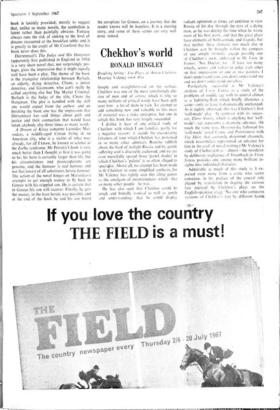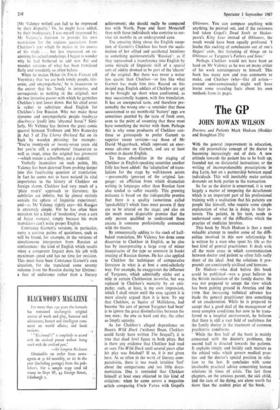Breaking String : The Ploys of Amon (hekhot , Maurice Valency
Loup 45s)
Chekhov's world
RONALD HINGLEY
Simple and straightforward on the surface, Chekhov was one of the most tantalisingly elu- Sive of men and of artists; which is why so many millions of critical words have been spilt over lot of them in lain. To attempt to add something new and valuable to this mass of material was a risky enterprise, but one in which this book has very largely succeeded.
I dislike it least of any critical study of Chekhov with which I am familiar, partly for a negative reason: it avoids the excruciating falseness of tone which Chekhov has provoked in so many other admirers. Routine rubbish about the bard of twilight Russia and his gentle suffering soul is discreetly eschewed, and we are even mercifully spared those 'pastel shades' in which Chekhov's 'palette' is so often alleged to speci4ise. Above all, no attempt has been made to fit Chekhov to some simplified synthesis, for Mr Valency has rightly seen this ailing genius as the amalgam of inconsistencies which—like so many other people he was.
He has also seen that Chekhov could be tough and brutally ironical as well as gentle and understanding.: that he could display radiant optimism at times, yet continue to view Russia of his day through the eyes of a dying man, as he was during the time when he wrote most of his best work; and that the great plays have elements of both comedy and tragedy, but that neither these elements nor much else in Chekhov can be brought within the compass of any simple formula except possibly one of Chekhov's own, addressed to Dr I.vov in
iranov. 'No. Doctor, we • have too many wheels, screws and yak es to judge each other on first impressions or one or two pointers. I don't understand y oil, you don't understand me and we don't understand ourselves.'
Particularly successful is Mr Valency's analysis of Uncle Vanya as a study of the problems of middle age with its central climax, as a lightning-flash which briefly illumines a scene—only to lease it dramatically unchanged. As is rightly observed, this was Chekhov's first 'well-made' play by contrast with its succes-. sor, Three Sisters, which is anything but 'well- made'—yet represents a di amatic advance. (In much the same way, Dostoievsky followed his 'well-made' nose! (rime and Punishment with The Idiot, that curiously disjointed chronicle, which nevertheless represented an advance for him in the craft of noel writing.) Mr Valency's study of Chebuty kin as -almost—the murderer by deliberate negligence of Tusenbach in Three Sisters provides one among many brilliant in- sights into individual character.
Admirable as much of this study is. I ex, peeled even more from a critic who seems conscious in his preface of the crucial role played by translation in shaping the curious fate enjoyed by Chekhov's plays on the English-speaking stage. 'No one who compares versions of Chekhov's text by different hands
[Mr Valency writes] can fail to be impressed by their disparity.' Or, he might have added, by their inadequacy. I was myself impressed by , Mr Valency's decision to provide his own translation for the copious quotations from Chekhov's text which he makes in the course of his study . . . but less impressed on ex- amining his actual renderings. I began to wonder why he had bothered to add new flat and wooden versions of what has been translated flatly and woodenly so often before.
When he makes Helen (in Uncle Vanya) tell Voynitsky that 'we are both lonely people, tire- some, and unsympathetic,' he is inaccurate to the extent that his 'lonely' is intrusive, and corresponds to nothing in the original; nor do two intrusive pauses with which he garnishes Chekhov's text lower down. But his chief error_ is rather to substitute dead English for Chekhov's live Russian. Why not make those tiresome and unsympathetic people (nudnyye skuchnyye lyud:) into 'abysmal bores'? Simi- larly, Mr Valency has thrown the great comic quarrel between Trofimov and Mrs Ranevsky in Act 3 of The Cherry Orchard flat on its Sack by wooden phrasing; for example: 'You're twenty-six or twenty-seven years old but you're still a sophomore' (inaccurate as well as inept, since the original has gimnazist —which means a schoolboy, not a student).
Verbally insensitive on such points, ,Mr„ Valency has been deterred from probing deeper into this fascinating question of translation; in fact he seems not to have noticed its vital importance to the history of Chekhov on foreign shores. Chekhov had very much of a 'plain man's' approach to literature; his subtleties are infinite, but lie almost entirely outside the sphere of linguistic experiment; and—as Mr Valency rightly says—his Rusian is extremely simple. Yet he has often been mistaken for a kind of 'modernist,' even a sort of Joyce manqué, simply because his main translators can't write proper English.
Constance Garnett's versions, in particular, carry a curious patina of quaintness, such as will be found, for example, in the versions of simultaneous interpreters from Russian at conferences: the kind of English which results when a competent linguist does his job with maximum speed and has no time for revision. This must have been Constance Garnett's own situation, for she translated some seventy volumes from the Russian during her lifetime: a feat of endurance rather than a literary achievement; she should really be compared less with North, Pope and Scott Moncrieff than with those individuals who contrive to sur- vive six months in an underground cave.
The amazing thing about the English recep- tion of Garnett's Chekhov has been the accla- mation of her stilted and accidental locutions as something quintessentially 'Russian': as if they represented a transference into English by some miracle of linguistic skill of a special sort of oddity deemed to be part of the 'charm' of the original. But there was never a writer less quaint than Chekhov—or less like what Garnett has made him into. Reared on this insipid pap, English addicts of Chekhov are apt to be brought up short when confronted, as may occasionally happen, with live translation. It has an unexpected taste, and therefore pre- sumably the wrong one—a reminder that those accustomed to eat month-old 'battery' eggs are sometimes puzzled by the taste of fresh ones, even to the point of assuming that these must have something the matter with them. Perhaps this is why some producers of Chekhov con- tinue so grotesquely to prefer Garnett to superior recent versions—say those of Mr David Magarshack, which represent an enor- mous advance on Garnett, and are at least written in decent English.
To these absurdities in the staging of Chekhov in English-speaking countries another folly has been added: the 'adaptation' obtrans- lations for the stage by well-known actors —presumably ignorant of the original lan- guage: an affliction from which dramatists writing in languages other than Russian have also tended to suffer recently. This growing nuisance is based on the indisputable premiss that there is a quality (sometimes called `speakability) which lines must possess if they are to be uttered on the stage; and also on the much more . disputable premiss that the only person qualified to understand these arcana is someone professionally oonnected with the theatre.
By unnecessarily adding to the stock of half- baked translation, Mr Valency has done some disservice to Chekhov in English, as he also has by incorporating a large crop of minor inaccuracies of the type so common in books treating of Russian themes. He has also applied to Chekhov the techniques of comparative literature in what is at best a semi-scholarly way. For example, he exaggerates the influence of Turgenev, which admittedly sticks out a mile in certain Chekhovian juvenilia, but was replaced in Chekhov's maturity by an anti- pathy; such, at least, is my own impression, which I shall retain until the case against it is more closely argued than it is here. To say that Chekhov, as Squire of Melikhovo, had become 'the sort of person Turgenev had been' is to ignore the great dissimilarities between the two men: the one so hard and dry, the other so limply squashy.
As for Chekhov's alleged dependence on Ibsen's Wild Duck (`without Ibsen, Chekhov could hardy have written The Seagull'), it is true that dead fowl figure in both plays. But is there any evidence that Chekhov had read or seen The Wild Duck until several years after his play was finished? If so, it is not given here. As so often in the wcrk of literary corn- parativists, there is too much intuitive 'feel' about the comparisons and too little docu- mentation. One is reminded that Chekhov himself at least once objected to this kind of criticism: when he came across a magazine article comparing Uncle Vanya with Gogol's Oblomov. You can compare anything with anything, he pointed out, and if the reviewers had taken Gogol's Dead Souls or Shakes- peare's King Lear instead of Oblomov, the result would have been equally profound. 'I loathe this sucking of conclusions out of one's fingers' ends, this fastening of things on to Oblomov or Turgenev's Fathers and Sons.'
Perhaps Chekhov would not have been so hard on Mr Valency as he was on many critics of his work contemporary to himself. This book has many new and true comments to make, and Chekhov (who—like all artists— created semi-consciously) might well have learnt some revealing facts about his own methods from its pages.































 Previous page
Previous page